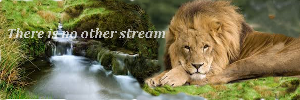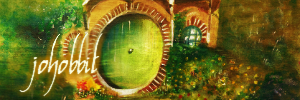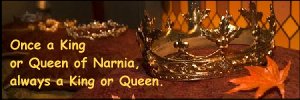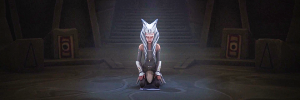Cleander, any particular reason why you haven't read LOTR?
Weeelll... my family never got into the books that much because of the fact that Gandalf, one of the heroes, is a wizard, and we're sort of uncomfortable with witchcraft being condoned in literature. ( Narnia is OK by this standard because "Black Sorcery" is condemned.)
Besides that, I'm sort of concerned that the powers of good and evil are almost given equal footing, as though there were no authority that made one really better than the other, and one's choice between the two was just a matter of taste. (That being said,I don't know that much about the books, so if I'm wrong about this, maybe you could explain.)
PM me to join the Search for the Seven Swords!
Co-founder of the newly restored Edmund Club!
Did I mention I have a YouTube Channel?: https://m.youtube.com/channel/UCeuUaOTFts5BQV3c-CPlo_g
Check out my site: https://madpoetscave.weebly.com
signature by aileth
Okay, so some of this is only hinted at LotR and is further expanded in The Silmarillion, but . . . here we go:
There is a higher power in Middle-Earth, Eru Iluvatar. He created the Valar (basically a combo of angels/minor deities) and then created the world with the Valar joining in harmony. The start of The Sil is literally an opera with Morgoth (a satan-like character) causing discord in the song, some of the others joining his version, and Eru bringing the song back to a beautiful harmony. And it's kinda-sorta a prophecy for what would happen in the first three Ages.
Fast-forwarding through the First Age because a lot of stuff happened . . . eventually Morgoth was defeated, but Sauron (Morgoth's apprentice) was still around. Gandalf and the other wizards are Maia (sort of angels). They were sent to Middle-Earth specifically to defeat Sauron and the other creatures who followed him. The Balrog Gandalf fights is considered to be a corrupted Maia (fallen angel).
The only people who practiced what might be called witchcraft were all followers of Morgoth and/or Sauron. Pretty sure the only one that comes up in LotR is the Witch-King of Angmar who was corrupted by one of the rings of power given to him by Sauron. And is unquestionably a really bad person who has completely faded under Sauron's power and is now a Wraith.
I am by no means an expert, but that is a very basic overview of the powers in Middle-Earth.
Cleander, you would find that Black Sorcery is condemned in Tolkien as well. Professor Tolkien was a devout Catholic, whose world view came through in his writings (but differently from Lewis).
The 'wizards' were not actually wizards as other fantasy depicts them, but spiritual beings clad in the semblance of old men. They are if you like, angels/servants of the higher power mentioned in the previous post.
It is a shame that some church groups have been scared off these books by the word wizard.
The whole of Lord of the Rings is full of Christian themes, if only you can see them. Sacrifice, redemption, temptation and fall, truth & deception, honour and evil, respect for the natural world and for all peoples. There are so many glimpses of Christ, seen in several of the main characters, including Aragorn, Gandalf, Frodo, Sam, and Faramir.
I read a very good book after I first read the Narnia books and Lord of the Rings; "Lord of the Elves and Eldils" by Richard Purtill. He describes a number of the Christian aspects in Lewis and Tolkien's books.
One that has stayed with me ever since is that every character in Lord of the Rings is on a sliding scale (a spectrum) of redemption. Some are evil through and through, and will not be redeemed, some will probably be lost yet have still the chance of being 'saved', some look like 'saved people' who could yet fall, and a small number look very unlikely to fall.
I think the writer probably hinted that we are all on that sliding scale, yet until the end of our lives we can still fall to evil or be redeemed by good.
I hope you will find yourself in a safe enough space to try reading the first book of Lord of the Rings, and may it be a blessing for you.
There, shining in the sunrise, larger than they had seen him before, shaking his mane (for it had apparently grown again) stood Aslan himself.
"...when a willing victim who had committed no treachery was killed in a traitor's stead, the Table would crack and Death itself would start working backwards."
To what extent would you say that Tolkien's works were influenced by Catholicism?
PM me to join the Search for the Seven Swords!
Co-founder of the newly restored Edmund Club!
Did I mention I have a YouTube Channel?: https://m.youtube.com/channel/UCeuUaOTFts5BQV3c-CPlo_g
Check out my site: https://madpoetscave.weebly.com
signature by aileth
Not much? I'm not Catholic, so it's entirely possible I'm missing some things, and certainly there are people who find Catholic symbolism in it. They are generally the sort of people who read Narnia as a straight allegory though rather than a supposal or a story that happens to have a Christ-like character. I think most of the themes are more generally Christian than specifically Catholic.
Cleander, thanks for your thoughts and openness. I hope you take the opportunity to look into Tolkien's works, which are permeated with his God-centered worldview. They are not allegories—Tolkien, himself, did not like allegories and states in a Forward to The Lord of the Rings that the tale is not allegorical. I would say that, as Dot above indicated, his works are more influenced by Christ than Catholicism.
For just one example, JRRT uses 'eucatastrophe'—his own coined word meaning "the sudden happy turn in a story which pierces you with a joy that brings tears"—to full effect in The Lord of the Rings and in The Hobbit too. He states "that the Resurrection [of Christ] was the greatest 'eucatastrophe' possible ... and produces that essential emotion: Christian joy." (Letter to his son, Christopher Tolkien, November 1944).
He quotes Jesus Christ (in Letter to another son, Michael, November, 1963, "He that hath seen me hath seen the Father" (John 14), stating in response that "We must therefore either believe in him and in what he said and take the consequences; or reject him and take the consequences." That gives you an idea of the great regard and awe he placed on Him.
As for the word "wizard", Tolkien wrote the following (Letter to Michael Strait, the editor of New Republic, Jan or Feb, 1956):
"Gandalf is a 'created' person; though possibly a spirit that existed before in the physical world. His function as a 'wizard' is an angelos or messenger from the Valar or ruler to assist the rational creatures of Middle-earth to resist Sauron, a power too great for them unaided."
Tolkien used the word 'wizard' (whom he called the Istari: "those who know", translated from the Quenya), not in the conventional sense of the word, but rather associated with wisdom and "conveniently conveyed to the reader the 'other worldly' powers of the characters' " (Tolkien Gateway on Middle-earth 'wizards: http://tolkiengateway.net/wiki/Wizards ). Again, from Tolkien Gateway, go to that link and read more on the "Istari", near the bottom of the page under "Etymology".
Btw, witchcraft is not condoned in Tolkien's writings. Dot and coracle have spoken to this well.
I, along with the others above, encourage you to start reading not only what Tolkien wrote, but also about the man, himself, to help you see how powerful and beautiful and timeless his books are. For myself, they have only helped me grow in my own walk with Jesus Christ.
We can offer reading suggestions to help you start, when you feel you're ready. 
EDIT: You may be interested in this, Cleaner (it's one of my favourite JRRT/CSL stories): in the very early morning hours of September 20, 1931, Lewis, Tolkien, and Hugo Dyson (another of the Inklings group) were having an in-depth talk on myth. They wandered outside to beautiful Addison's Walk at Oxford University far past the middle of the night. It was in these next few hours that Tolkien was was able to suggest to Lewis—and convince him—that since he loves myths so much, why not consider that there is one that is the One True Myth—the historicity of Christ and the gospel? How I would have loved to have listened in to that now-famous conversation, which opened CSL's mind and heart to what would eventually (9 days later) lead to Jack acknowledging that Christ was/is divine—the very expression of God!
When you have time, here is an informative article, as well as a short-ish video reliving how the conversation might have gone. (It was obviously not filmed past midnight in the video, but I'll allow them daylight so we can readily see the actors.  )
)
(Pardon the lengthy post, but this entire subject is a deep passion of mine—Tolkien, Lewis, their relationship, their lives, particularly their Addison's Walk talk.  )
)

Signature by Narnian_Badger, thanks! (2013)
7,237 posts from Forum 1.0
Thanks for the insights guys! The books do sound worth looking into (though I'd want to learn a bit more before I start reading them).
One other objection I neglected to mention before was the fact that I'm in the middle of writing an "epic fantasy series" and I was worried about possibly being influenced too much by him. Then again, as I hear more about LOTR, I keep noticing almost frightening similarities to what I'm writing!  (One of my biggest concerns with this is originality; since this genre is written in so much, it's hard to find fresh ideas. The last thing I want to do is unwittingly copy Tolkien! Then again, it might be a good idea to know more about his works for that very reason!)
(One of my biggest concerns with this is originality; since this genre is written in so much, it's hard to find fresh ideas. The last thing I want to do is unwittingly copy Tolkien! Then again, it might be a good idea to know more about his works for that very reason!)
PM me to join the Search for the Seven Swords!
Co-founder of the newly restored Edmund Club!
Did I mention I have a YouTube Channel?: https://m.youtube.com/channel/UCeuUaOTFts5BQV3c-CPlo_g
Check out my site: https://madpoetscave.weebly.com
signature by aileth
Cleander, since Tolkien basically founded this genre (modern fantasy) it's going to be impossible not to find you have used some of the same elements.
Just avoid having too many hobbits in the story! 



There, shining in the sunrise, larger than they had seen him before, shaking his mane (for it had apparently grown again) stood Aslan himself.
"...when a willing victim who had committed no treachery was killed in a traitor's stead, the Table would crack and Death itself would start working backwards."
 coracle!
coracle!
Cleander, Tolkien's books are definitely worth looking into!  Do know that JRRT and CSL wrote very differently (although from a common worldview premise): JRRT would edit his material for ages on end, so it took him about 12 years to complete his The LotR tome, alone, whereas, as you know, CSL cranked out the Narnia books like a fireball, plus many other books, both fiction and non-fiction; very different writing styles, and yet both so brilliant, with great depth and such rich meaning.
Do know that JRRT and CSL wrote very differently (although from a common worldview premise): JRRT would edit his material for ages on end, so it took him about 12 years to complete his The LotR tome, alone, whereas, as you know, CSL cranked out the Narnia books like a fireball, plus many other books, both fiction and non-fiction; very different writing styles, and yet both so brilliant, with great depth and such rich meaning.
I hope they can focus on these relationships. The dramatic events of the battles are less important
Hear-hear, yes-yes!

Signature by Narnian_Badger, thanks! (2013)
7,237 posts from Forum 1.0
The difficulty in my case was that some elements in my story matched Tolkien WAAAY too much (it wasn't hobbits though  ). Such things as powerful artifacts that could grant world dominion and immortality to its owner... and this was before I even knew what the One Ring was!
). Such things as powerful artifacts that could grant world dominion and immortality to its owner... and this was before I even knew what the One Ring was! 
Great minds think alike, I guess... *conceited cough*
I want to bring fresh ideas to the genre, which is kind of getting bogged down with the same old stuff, it seems. So resembling Tolkien is a bad way to start if he really founded this genre.
PM me to join the Search for the Seven Swords!
Co-founder of the newly restored Edmund Club!
Did I mention I have a YouTube Channel?: https://m.youtube.com/channel/UCeuUaOTFts5BQV3c-CPlo_g
Check out my site: https://madpoetscave.weebly.com
signature by aileth
Weeelll... my family never got into the books that much because of the fact that Gandalf, one of the heroes, is a wizard, and we're sort of uncomfortable with witchcraft being condoned in literature. ( Narnia is OK by this standard because "Black Sorcery" is condemned.)
Besides that, I'm sort of concerned that the powers of good and evil are almost given equal footing, as though there were no authority that made one really better than the other, and one's choice between the two was just a matter of taste.
I just read this and thought, 'Oh dear, there is so much I want to say to that' - and then I read the rest of the thread and found that daughter of the King, coracle and johobbit have said most of what I wanted to say.  So I hope you'll feel safe about trying the books on those grounds.
So I hope you'll feel safe about trying the books on those grounds.
I'll still add a few things, though. 
I agree with them that most of his themes are more generally Christian than specifically Catholic. A couple of his female characters may be influenced by the Virgin Mary, though, although not so much in The Lord of the Rings as in articles he wrote about those characters later in his life. One of them, called Elbereth, is a Vala, another sort of angelic being, and the Elves (and even some Hobbits) in LotR revere (but don't worship) her. The other I'm thinking about, is Galadriel, an Elf lady, almost a queen among the Elves, and an important character in LotR. (She's not a virgin, though, she's a mother and a grandmother.)
You might perhaps say that the powers of good and evil - as they appear in the world of Middle-earth - are almost given equal strength, but not equal footing. This is much like we see those powers around us in our own time. They may look equal in strength, and we may wonder whether good will be able to prevail, but we have God's promise that he will punish evil in the end.
Eru Iluvatar (Eru means "the One" and Iluvatar means "Allfather" in a language called Quenya that Tolkien made up) doesn't appear at all in LotR, I think he is hardly mentioned in the book. There is a lot more about him in The Silmarillion. Tolkien uses him very differently in his works from the way Lewis uses Aslan in his works. Tolkien is even more concerned with avoiding anything looking like allegory.
Eru also will punish evil in the end, at the end of the world. Morgoth has been defeated (and physically thrown out of the world) already, but minor enemies still exist, and Tolkien seems to be hinting that we won't get rid of all of those until the end of the world. Tolkien's initial idea (which he may have kept, only expressed less clearly over time) was that Middle-earth is our own world thousands of years ago, so the creator of that world is the same God as we know, only under an older name.
Tolkien has a story commonly called "The Athrabeth".
(That's a word from one of his own languages as well, and means 'debate'.)
It's a story of a discussion (from before the defeat of Morgoth) between an Elf and a mortal woman, a stand-alone story that didn't get into either the LotR or the Sil. In their discussion they discuss hope, and the woman tells that there is an old hope among her people that "the One will himself enter into [the world], and heal Men and all the Marring from the beginning to the end".
The Elf is encouraged by the news of this hope, and says that if Eru "will not relinquish His work to [Morgoth], who must else proceed to mastery, then Eru must come in to conquer him." And if any healing from all the harm that Morgoth has done, is to be found, "any new light to oppose the shadow, or any medicine for the wounds: then it must, I deem, come from without."
This is the closest Tolkien ever gets to referring to the redemption story in all of his fiction. He deliberately stops at this point, and is not even sure whether to include it in his greater works or not - and it ended up as a stand-alone story.
But that story is one of my favorite texts among everything Tolkien has written.

(avi artwork by Henning Janssen)
I just finished up a reread (time 3 or 4) of Tolkien's essay/lecture "On Fairy-stories" because I felt I needed a refresher on some of the points he makes about storytelling. I wound up taking from it more spiritual insight than writing insight this time through. His thoughts on Christ's Incarnation as the great Eucatastrophe of history and the way in which we as humans sub-create as part of God's creation just lifted my spirits and fed a part of my soul I hadn't realized was hungering.
If you haven't read through this one, give it a go. It helps lay out a lot of Tolkien's views on storytelling, and how his faith informs those views.
On that note, I would say the one major way his Catholicism influences his stories is that he takes a sacramental view of the world. By which I mean, he sees more than just baptism and Communion/the Eucharist (to say nothing of the other sacraments recognized by the Catholic church) as the vehicles of God's grace in human lives. This shows up somewhat in "On Fairy-stories" but also in greater (yet more subtle) ways in his fiction. Starlight on a lonely night, good food and fellowship, friendship in hard times, and even stories told by a fire are received as a sort of sacrament; they strengthen the recipients for the journey ahead, bind them more closely to Eru (i.e. God), and remind them that there is more at work in the world than the will of evil.
"All the world will be your enemy, Prince with a Thousand Enemies. And when they catch you, they will kill you. But first they must catch you..."
Inexhaustible Inspiration
6689 posts from forum 1.0
Tolkien has a story commonly called "The Athrabeth".
Oooooh, that sounds lovely! I haven't read that one yet. Do you know which book it's published in? I have copies of a lot of the "extra" published works like Tales from the Perilous Realm, but haven't read most of them in depth.
Tolkien has a story commonly called "The Athrabeth".
Oooooh, that sounds lovely! I haven't read that one yet.
Same here! It looks like I need to read "On Fairy-stories" as well! I've recently seen artwork on the story of Andreth and it looked intriguing, but I didn't know which work it was in. After googling "The Athrabeth" I think that must be it. It is included in The History of Middle Earth volume 10, Morgoth's Ring
Aahhh, I love Tolkien's essay "On Fairy Stories"! I can really see how it would lift one's spirits, st. So glad you found encouragement there.
Tolkien has a story commonly called "The Athrabeth".
How have I missed this?!!  Morgoth's Ring is one of the HoM-e volumes I do not yet have. Well, that is going to change soon.
Morgoth's Ring is one of the HoM-e volumes I do not yet have. Well, that is going to change soon. 

Signature by Narnian_Badger, thanks! (2013)
7,237 posts from Forum 1.0



